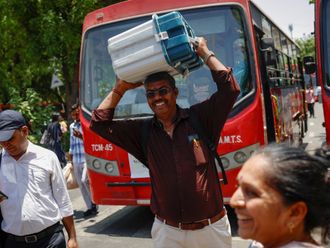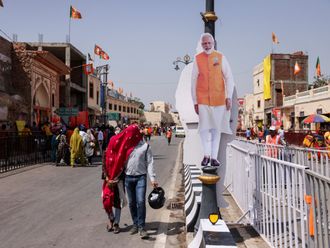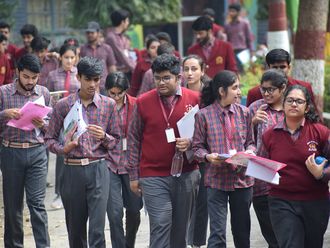Vijayawada, New Delhi: The South Indian state of Andhra Pradesh, which lost Hyderabad to its neighbour Telangana, is planning a new capital near Vijayawada at an estimated cost of over Rs135 billion (Dh7.8 billion) but hurdles have cropped up over land pooling issues with farmers.
The ambitious capital city of Amaravathi, the seat of power of the ancient Satahavanas Kings, 80km from Vijayawada, has been focused by the Andhra Pradesh government, which has worked out the plan with a Singapore firm and the public sector National Building Construction Corporation (NBCC).
Thirty-three thousand acres of land, mostly agriculture, is being acquired by the government from farmers in coastal Guntur and Krishna districts for the new capital, which will have a spanking new Secretariat and a legislature complex including the assembly and council, Raj Bhavan and residential quarters for employees.
According to a senior official, the government would go for land acquisition in case it fails to get agreements done with all the farmers who “offered” their land for the capital city.
“As per international standards it requires about $2 billion for the capital region construction. It spreads over about 80km. The activity may get delayed if the land agreement issues remain unresolved,” the official told PTI.
When contacted, Srikanth Nagulapalli, Commissioner Capital Region Development Authority, refused to put a figure on the construction cost saying they are still working on that.
According to him, the Singaporean firm’s job is to prepare master plan for the city and identify master developer also.
“As per the agreement with the Singapore firm, it will give us master plan free of cost. They are also expected to identify master developers for us. The state government is yet to take to decision on master developer issue,” he said.
Infrastructure Corporation of Andhra Pradesh and International Enterprise, Singapore, signed an MoU according to which both the parties will “cooperate in the master-planning, development and construction of the capital city of Andhra Pradesh as a modern, vibrant, sustainable and smart capital city with a strong economy, excellent social amenities and efficient transport and logistics networks.
The 7,325-sq km Capital Region Plan is the first of a three-stage master plan for the capital city.
Noted activist Anna Hazare also wrote a letter to the Andhra Pradesh chief minister requesting him to spare fertile land from pooling for the capital.
The government wants to develop the capital as a modern city that is convenient to poor people also. Under phase-1, the plan proposes how the whole area can be positioned to grow economically in the long run.
The plan identifies the appropriate long-term economic positioning of the existing towns and cities within the capital region and the context, therefore, for the growth and development of the future Andhra Pradesh capital city.
It includes a regional socioeconomic analysis and demographic study and recommends a set of strategies to enhance connectivity and undertake transit-oriented urban development while protecting agricultural and heritage areas.
NBCC, functioning under the Union Urban Development Ministry, has prepared a Detailed Project Report (DPR) for the public infrastructure.
“We have submitted the DPR to Andhra Pradesh government. It would cost Rs13,500 crore [Rs135 billion] to create such infrastructure in the state’s new capital,” a top NBCC source told PTI.
Asked about the salient features of the new capital, the sources said the city could have river front development, since it is being established on the banks of a river.
According to Andhra Pradesh government sources, the new capital is being modelled as a gateway of South Asia to house the offices of corporate MNC firms.
“We are looking at a capital city with a mix of features from Singapore, Tokyo, Germany and New York. It would be tourism built in city, as well,” a source claimed.
“We are taking cue from New York and Germany as the city in the United States is a popular commercial hub, while Germany is advanced in technology,” the source added.
According to experts with construction majors, the government should spend approximately Rs60,000 per square metre for creating world class infrastructure in the new capital city.












